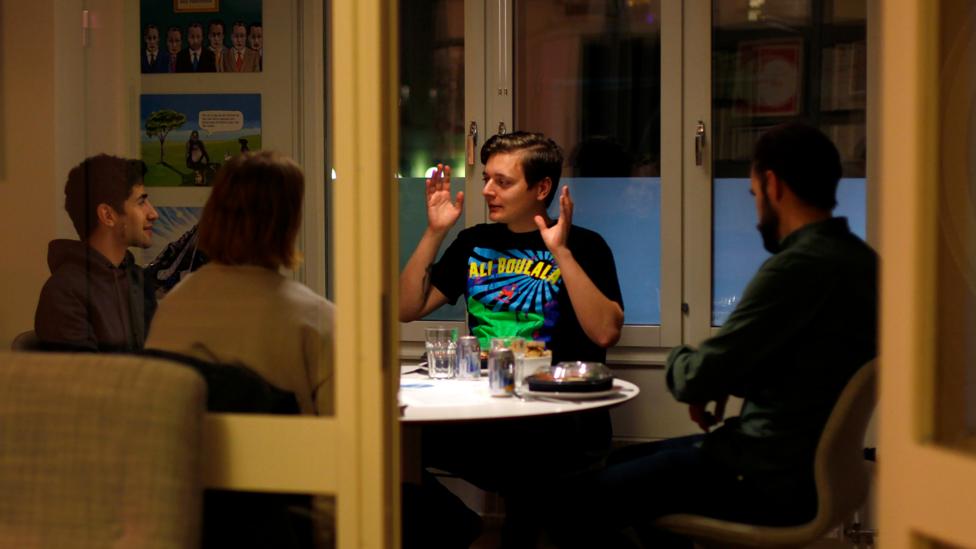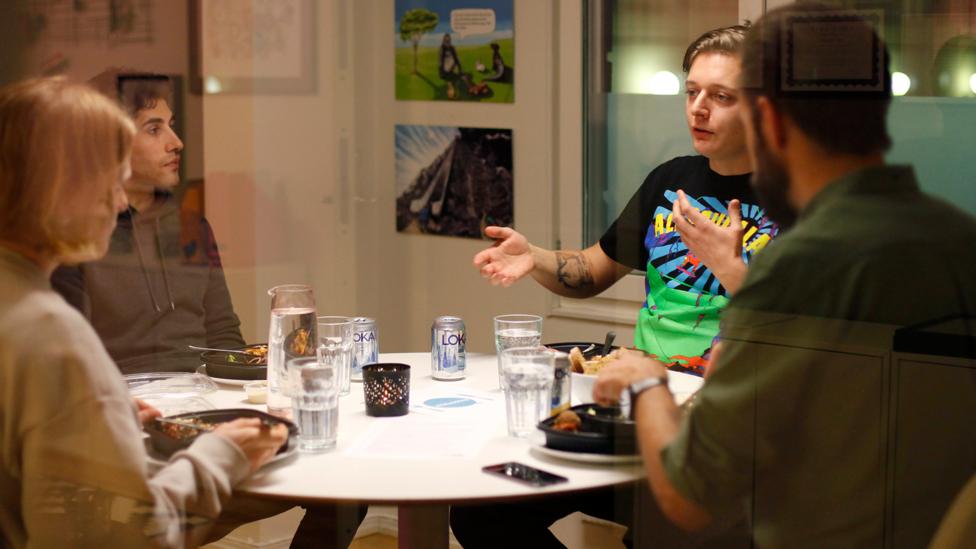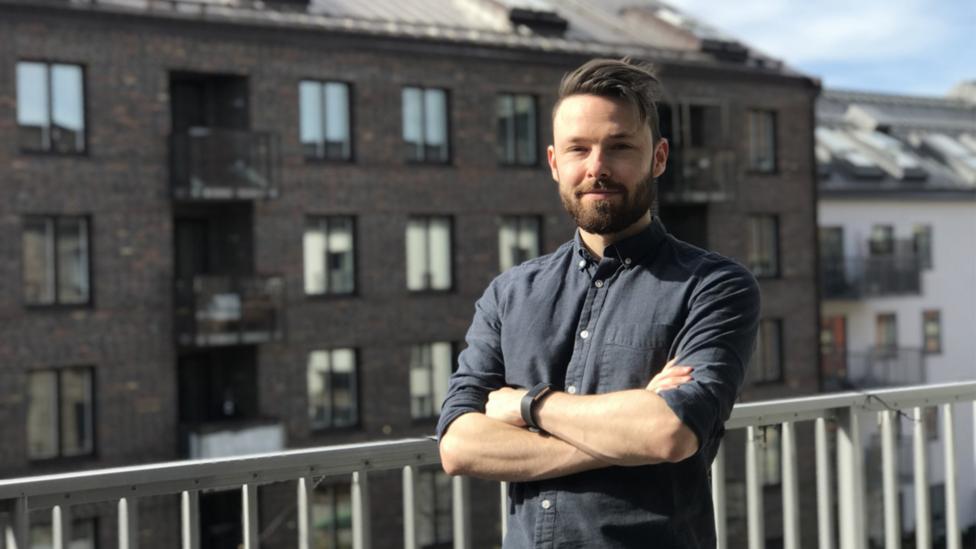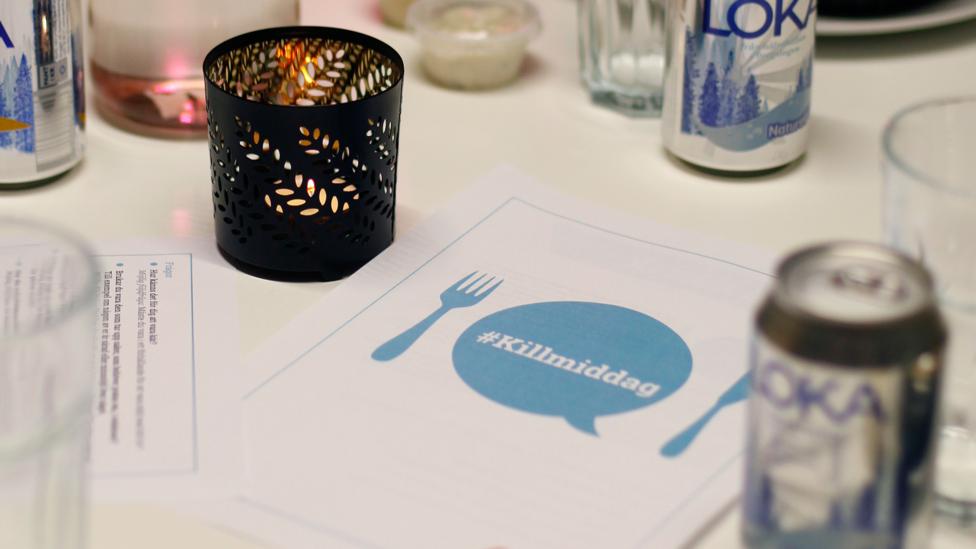
Private dinners where men discuss feelings and equality have taken off in Sweden.
Few topics are off-limits at the male-only meetings attended by Swedish entrepreneur and environmentalist Johannes Wretljung Persson. The impact of porn, groping in clubs and misogynist banter at work have already been widely debated.
The 33-year-old says the goal is to create an environment in which a handful of men can “talk about inequality and patriarchy, and how to be a better human being”.
“It’s things people have done in the past, that they realise, ‘This is so bad that I did this!’,” adds Tård Wennerborg, a tech worker who is another attendee and organiser of the events, which take place in Västerås, west of Stockholm. “Also things you haven't done – you have heard other people say things or do things, and you haven’t reacted or opposed it.”
Across Sweden, thousands of men have participated in these single-gender get-togethers in recent years, according to non-profit organisations Make Equal and MÄN, which work to promote equality. Events have ranged from candle-lit dinner parties to debates over take-away tacos or simple coffee evenings after work in empty offices. Many follow set guidelines such as asking participants to speak for a similar amount of time on a specific gender-related topic without interruption (and with complete confidentiality). Others serve as more informal support sessions in which men focus on their own current relationships and mental health.
‘The interest was enormous’
Although Swedish feminist groups have long encouraged men to participate in discussions about gender equality and identity, all-male talk groups took off exponentially in 2016, in the wake of a string of assaults against women at Swedish music festivals. The female co-founder of Make Equal, Ida Östensson, posted on Facebook that men should consider getting their own private groups together to discuss the problem. Her call went viral within minutes.

Make Equal, a Sweden NGO which works to promote gender equality, holds killmiddag dinners to offer a platform for men to discuss gender sensitive topics (Credit: Make Equal)
“The interest was enormous,” reflects the organisation’s spokesperson Kristina Wicksell Bukhari. “Many men had felt frustrated to get accused of being ‘responsible’ [as a gender] without being able to be a part of the solution, being able to do something about it.”
The organisation created a website with suggested topics and advice on how to make the most of conversations. The hashtag ‘killmiddag’ (which translates as ‘guy’s dinner’ or ‘guys talk’ in English) began trending.
The rise of the Me Too movement the following year kept the concept in the spotlight. Despite Sweden’s reputation as a world leader in championing women’s rights, there were high-profile accounts of sexual assaults and discrimination in Swedish industries across law, architecture and the arts, alongside calls for structural change.
Other Swedish groups working to promote equality helped to spread the word about killmiddag and stepped up their own similar initiatives. MÄN put on outreach events in 30 towns and cities for men to discuss the concerns of the Me Too movement, which included analysing anonymous texts by men describing their behaviours. The organisation also created its own online material designed to encourage smaller structured discussion sessions geared around personal reflection. Meetings are still happening around the country.
“A lot of guys that have been in the groups say maybe just after the first session that, ‘Well, I never talked about this with anybody, not even my closest friends’,” says Mattias Lindholm, vice-president of MÄN’s branch in Uppsala, north of Stockholm. “I think that says something about the kind of safe space that we can create.”
It’s a view backed up by David Midhage, a 31-year-old construction engineer who participated in a series of structured killmiddag events in the city last year after hearing about MÄN’s initiative via Facebook.
“At first I was really sceptical about joining at all, because it is a foreign thing to do as a man to talk about those kinds of feelings and experiences,” he recalls. “But it was really a relief to hear other men’s experiences regarding ‘How should I act?’, ‘How should I not act’... they had the same kind of confusion like I had.”

David Midhage, a 31-year-old construction engineer, participated in a series of structured killmiddag events in Uppsala (Credit: David Midhage)
He says it was easier to share his emotions and experiences with strangers, rather than break the norms of his friendship group, in which feelings or debates about gender identity are not typical topics of conversation.
Wicksell Bukhari at Make Equal says she has also received “awesome feedback” from the female partners of those who have participated in killmiddag dinners, who have acknowledged the benefits of offering men a new arena in which to discuss equality or other sensitive topics.
“It's pretty common that men only speak with their girlfriends about their feelings and their relationships and their traumas,” she says. “The women don’t have to do all the talking and the supporting now.”
The challenge of self-selection
Yet while male-only discussions have clearly had an impact for many on a personal level, even their most vocal advocates have raised concerns that participants are self-selecting.
“It's hard to attract the ones that maybe most need this, because they would probably not go to these meetings voluntarily,” reflects Tård Wennerborg, who has attended and arranged both large-scale and more intimate events for MÄN in Västerås.
Johannes Wretljung Persson, however, points out that most participants have so far had a “broad spectrum” of job titles and interests including teachers, politicians, craftsmen and sport fans “coming from quite a masculine culture”. He hopes that as the concept spreads, it will have a knock-on effect on influencing conversations and behaviours outside meetings, in an increasingly wide range of workplaces and friendship groups.
But supper clubs aren’t embraced by everyone as a solution to inequality. Anneli Häyrén, a researcher at Uppsala University’s Centre for Gender Science, argues that all-male groups risk perpetuating “negative masculinity”.
She believes those who “don't really know when they are harassing or not harassing” could end up still confused about where to draw the line, and argues that efforts in mixed-gendered settings, such as increased education and structured discussions in schools and workplaces, would have a wider impact.

Killmiddag’ translates as ‘guy’s dinner’ or ‘guys talk’ in English (Credit: Make Equal)
Killmiddag attendees like Wretljung Persson, however, argue that just as women’s networks are widely regarded as useful safe spaces in which to hold productive discussions on gender norms, men can also be constructive in similar environments. “I think it's like a necessary evil until society is more equal,” says Wretljung Persson. “In one of these meetings, no question is a bad one.”
David Midhage in Uppsala says it is important to differentiate Sweden’s all-male discussions from radical men’s rights groups or incel forums who feel discriminated against in an increasingly feminist climate. However, he accepts that there might be some overlap when it comes to shared frustrations, such the uncertainty of how or when to approach women in a post Me Too world.
“That raises the bar even further for those kind of persons who are isolated,” he says. “I can kind of understand where their resentment comes from.”
But any kind of misogynistic comments are unwelcome at killmiddag meetings, and he believes anyone who crossed the line would be quickly called out by other attendees. “I would say it would happen quite naturally that people would question – perhaps not in very confronting way, like, ‘I believe that that was a stupid thing to do’, but more like, ‘What was the reason behind doing this and that?’.”
Other critics have bemoaned the killmiddag concept for undermining traditional notions of masculinity, which they argue should be preserved. Ivar Arpi, a Swedish author and political columnist, says that although he has “nothing against” those who want to discuss their feelings around a dinner table, many men would not feel comfortable with the concept and would rather adopt tactics such as channelling their emotions and frustrations into sport.
“It's not a universally good idea to talk about stuff. And it's not universally good to locate your problems to masculinity,” he argues. Arpi points to research which suggests that factors other than gender-related attitudes can also play a role in sexual assault and harassment. These include perpetrators’ alcohol or substance abuse, other criminal activities, personality disorders or their own previous experiences of sexual abuse.
Encouraging men to talk to each other in a general sense is perhaps more important than ever as the Covid-19 pandemic continues
“The focus should be on those groups of men that are most likely to commit these crimes, not on all men. Solutions like killmiddag make the participants feel better about themselves, for sure, but they fall short of achieving anything beyond that,” he argues.
However, there is no set profile of a sex offender, and Sweden’s Public Health Agency last year labelled the extent of sexual assault and harassment against women “a major public health problem”. Half of all women questioned for its research said they had experienced some form of harassment, compared to just one in 10 men.
The impact of Covid-19
Away from debates about how much influence all-male discussion groups can have on limiting sex crimes, supporters of the concept argue that encouraging men to talk to each other in a general sense is perhaps more important than ever as the Covid-19 pandemic continues.
Johannes Wretljung Persson reflects that even though Sweden has not introduced a full lockdown, “loneliness or people being single and isolated” is a concern for some members of his group alongside increased levels of domestic violence on a national level. Events have, of course, moved online, in step with national guidelines surrounding social distancing.
In the northern Swedish city of Örnsköldsvik, Jon Moraeus, who also runs digital killmiddag events, says his group has been discussing how men can handle uncertainty. There are growing concerns about personal and national finances as the global economy is hit by the pandemic, and intense scientific disagreements in Sweden about whether it’s taken the right approach.
“I think that often men think things should be ‘black’ or ‘white’ ... one thing we touched upon in our last meeting was ‘How okay is it to just not know?’,” says the 38-year-old, who is a mental health coach and council worker.
Make Equal’s Wicksell Bukhari says another suggested current dinner topic is how male gender norms may be feeding into evidence that Swedish men are more likely than women to ignore social-distancing guidelines. “I think that has to do with the toxic masculinity in a lot of ways. The picture that you have to be independent and not do things for others, for example.”
The future
Make Equal has recently expanded its outreach work to include a book and two podcast series called ‘Everything we don’t talk about’, which builds on many of the topics already discussed at killmiddag events. It has also started working with organisations in other countries to try and expand the concept of killmiddag globally, although its organisers are cautious about committing to when the project will spring into action.
“I think all men can become better at expressing their feelings and managing their feelings and reading other people's needs,” concludes Wicksell Bukhari. “Even those who have had a feminist awakening, they need this [help] and they are not perfect.”
“I would definitely recommend it,” adds former killmiddag sceptic David Midhage. “The more difficult you find a topic to talk about, the more important it is to talk about.”
culled from bbc.co.uk


No comments:
Post a Comment